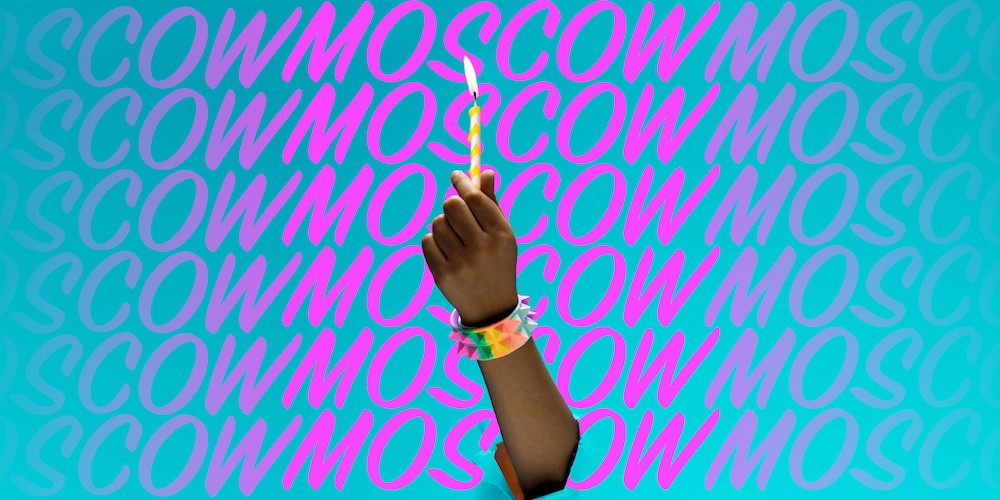Chekhov Fever Dream: MFA Acting Students Perform in 'Moscow Moscow Moscow Moscow Moscow Moscow'

As we left the Lenfest Center theatre on November 20, 2021, my friend called the performance of Moscow Moscow Moscow Moscow Moscow Moscow we had just seen a “Chekhov fever dream.”
Pop music, pink lights, characters drinking a lot of vodka, lounging on couches moaning about being miserable; I don’t think there could be a better description for this millennial Chekhov mashup.
As a thesis production, it’s a fantastic showcase for the skilled MFA Acting Class of 2022.
Written by Halley Feiffer, Moscow Moscow Moscow Moscow Moscow Moscow is a version of Anton Chekhov’s Three Sisters that uses contemporary dialogue and a referential postmodern sensibility to transform the classic drama into a ruthlessly meta comedy.
Sisters Olga (Merlixse Ventura), Masha (Julian Abelskamp), and Irina (Gülin Langbroek), along with their bookish brother Andrey (John-Henry Hirozawa) have been relegated to country life following the death of their father and the gambling away of the family fortune by Andrey. They miss Moscow, are bored to death in the country, and will tell anyone who will listen.
It’s a bingo card of Chekhovian tropes, and it invites the audience to play along: reduced financial circumstances, inappropriate infatuations, complaining, boredom, and a country house. Laundered through ultramodern up-speak, these themes emerge in hilariously metatextual, on-the-nose lines like: “Because that’s what life is I think? Just doing horrible things and complaining about them?”
A text with so many layers of irony is a challenge for actors. It requires self-awareness, comedic timing, as well as dramatic commitment and an ability to make us feel for these often unbearable people. Fortunately, this cast is universally strong.
In a bit of casting gender-play, apparently mimicking the 2019 Broadway run of the show, Masha is played by Julian Abelkamp, while Masha’s feckless math-teaching husband Kulygin is played by the incandescently funny Sarah Chalfie, who makes a meal out of Kulygin’s oblivious enthusiasm, and pet names for his wife.
Masha, for her part, can’t stand Kulygin, and instead falls into a passionate emotional affair with visiting officer Vershinin (Michael Brannian).
Brannian, who smilingly deadpans the line “I have a wife and two little girls” over and over, is adept at pitching his cheerful, confident bluster to emphasize the darkness of a joke.
As Masha and Vershinin, Abelkamp and Brannian have incredible chemistry. Tender and flirtatious, their eyes follow each other across the room, and the air between them seems to glow with mutual delight and desire.
Broody brother Andrey and his vivacious girlfriend Natasha (the luminous Kristin Dodson) begin the play as excitable, lusty lovers. When they share a sex scene (going far beyond the chaste kisses of other Chekhov productions) it’s imbued with all their misfit desperation, and an aching love for one another.
It’s all the more heartbreaking when later scenes find them as a married couple, disillusioned, fractious, and tense. Dodson adeptly lands the hairpin oscillations between vulnerable and imperious; we’re sorry for her as she all but pleads for her husband’s attention, and we want to shake her as she bosses the sisters around.
As the youngest sister Irina, Langbroek also threads a difficult needle. Her Irina is idealistic, but also whiningly scornful, annoyed by the attentions of Baron Tuzenbach (Michael Karadsheh) and Solyony (Josh Lak Kim). A few acts later, having taken work as a municipal employee, she’s burned out, more matter-of-fact, but still with the sparkle of young Irina. It’s an impressive balancing act.
Karadsheh as Tuzenbach is a jolt of energy whenever he walks onstage, and Lak Kim’s stolid Solyony, wound tight with repressed feeling, is an effective foil. Julian Shaheen as the grating, cowardly, but pitiable family friend, Chebutykin, manages to find our sympathies with a hangdog expression and one well-timed shot of vodka. Notable mention as well is due to Charles Denton and Emily Klaypas for gamely playing hunched and decrepit servants Ferapont and Anfisa for appropriately goofy laughs, with just a hint of pathos.
The mix-and-match sense of play in the dialogue is echoed in the costumes and set. There are some vestiges of period dress, like Tuzenbach and Solyony in military overcoats, but they co-exist with contemporary articles like pencil skirts, sweater vests, and jumpsuits. It creates a sense of in-between time and place, the ideal setting for this world.
As director Claire Karpen says in her show notes: “we have mashed up costumes, set, props, music, and behavior, to get at a human experience that bridges 1900 to 2021, and—hopefully—lands the truth of living even more viscerally.”
Karpen shapes Moscow Moscow Moscow Moscow Moscow Moscow into a delightful postmodern mille feuille, served by a cast of MFA performers who find the compelling tension between razor-sharp comedy, alienation, and hopeless yearning.
Moscow Moscow Moscow Moscow Moscow Moscow will be available for streaming January 20-23, 2021.